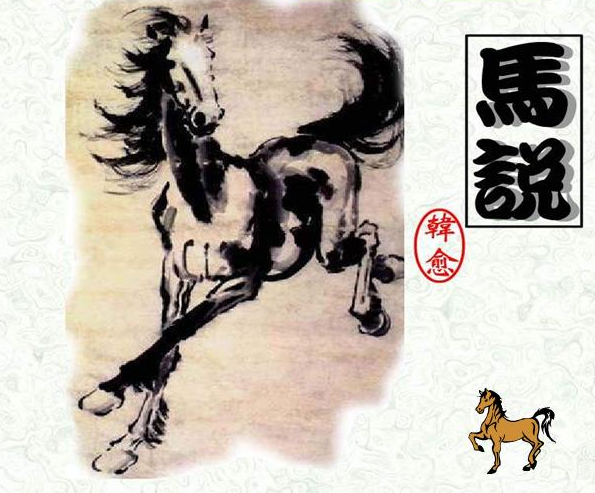(单词翻译:单击)
《马说》是唐代文学家韩愈的一篇借物寓意的杂文,属论说文体,原为韩愈所作《韩愈文选》中《杂说》的第四篇,“马说”这个标题为后人所加。此文作于贞元十一年至十六年间(公元795—800)。“说”是“谈谈”的意思,是古代一种议论文体裁。这篇文章以马为喻,谈的是人才问题,表达了作者对统治者不能识别人才、不重视人才、埋没人才的强烈愤慨。

《马说》 韩愈
世有伯乐,然后有千里马。千里马常有,而伯乐不常有。故虽有名马,祇辱于奴隶之手,骈死于槽枥之间,不以千里称也。
马之千里者,一食或尽粟一石。食马者,不知其能千里而食也。是马也,虽有千里之能,食不饱,力不足,才美不外见,且欲与常马等不可得,安求其能千里也?
策之不以其道,食之不能尽其材,鸣之而不能通其意,执策而临之,曰:“天下无马。”呜呼!其真无马耶?其真不知马也!
On Horses
Han Yu
Only after Bole came into the world were there horses able to gallop one thousand li. Such horses are common, but a Bole is rare. So even fine steeds, if mishandled by slaves, will perish in their stables without being known as good horses.
A thousand-li horses may eat one bushel of grain at a meal, but if its groom does not know that this is what enables it to gallop a thousand li and fails to feed it enough, so that it lacks strength, it will not display its ability and natural gifts. Indeed, it may be no match for common horses; so how then can it gallop a thousand li?
If it is whipped and goaded on in the wrong way, too underfed to reveal its full worth, or if it neighs and the trainer treats it without understanding, then the rider may hold his whip over it exclaiming: "There are no good horses in the word!" But does this mean there are truly no good horses, or that he does not understand horses?
更多精品翻译素材,敬请关注可可英语。


